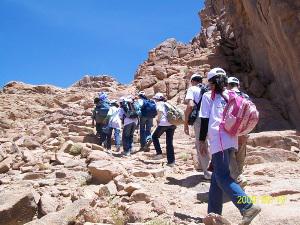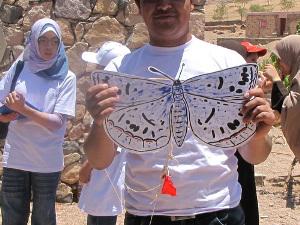Alaa El-Deen Ismail
This project monitors the ecological status of the Sinai Baton Blue butterfly and ensure the conservation of the Sinai Baton Blue butterfly in a healthy environment.

St Katherine Protectorate (StKP) is one of the country's most important protectorates in Egypt, covering 4300 km2. The Sinai Baton Blue butterfly is a flagship species for the StKP because it is endemic here, and is one of the most endangered species in Egypt. The larvae feed only on the flowers of Thymus decussatus, the Sinai Thyme, a near-endemic plant that is also a conservation priority for Egypt.

Previous work indicates this butterfly is at risk from climate change, and threatened by its small fragile population size and fragmented habitat, as well as the growing human activities in the area. The grant will enable us to support better and extend the butterfly monitoring programme each year, including more staff into training of the methodology (mark-release-recapture - MRR) so as to ensure long-term sustainability of monitoring. It will enable us to renovate and extend a paved path through the site of the main stronghold of the butterfly (Farsh Shoeib), which will reduce trampling on the habitat, currently a serious problem. In Farsh Shoeib it will enable us to enclose the main rocky gulley where hostplants and butterflies are densest, eliminating grazing of Sinai Thyme there: this will secure a refuge of good quality larval habitat. The grant will pay for public meetings with local Bedouin, because their active support is necessary for the measures to work.
The activities of the project may be summarized as follow:
1. Implement an annual survey for the butterfly during the activity season using MRR. Climatic data will be collected by the portable weather station;
2. Design and implement a paved path around the Farsh Shoeib habitat to encourage visitors not to trample the site, using environmentally friendly materials;
3. Reactivating the traditional hilf agreement used by local Bedouin to prevent over harvesting in wadis; applied to Farsh Shoeib, this will control grazing during the active season. Agreement will entail giving these people alternative feed for their livestock;
4. Make a fenced enclosure around the main gulley of Farsh Shoeib where hostplants and butterflies are densest;
5. Public awareness campaigns will directed toward local communities and tourists to embed the ideas of conservation and ecotourism, by making presentations and workshops, and distributing printed material.